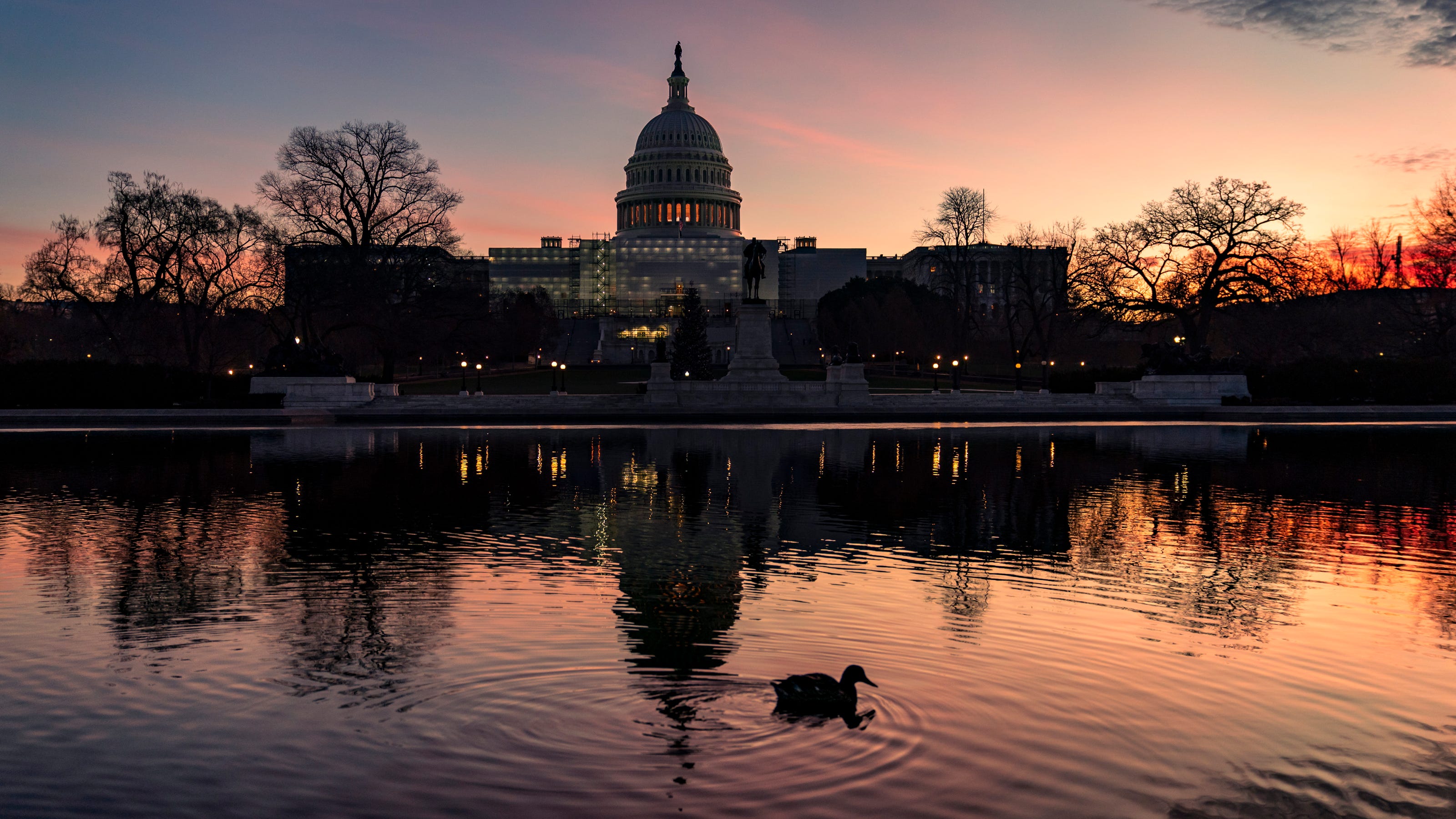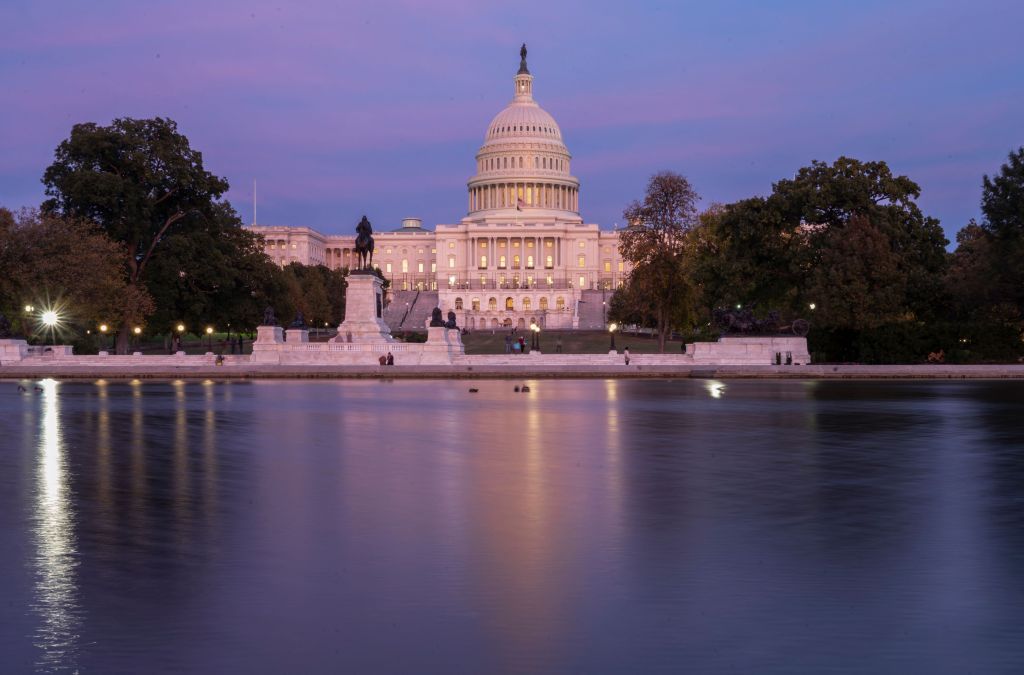Eighteen Republicans helped the U.S. Senate overwhelmingly pass a $1.7 trillion spending package that includes record amounts for domestic programs and defense priorities as lawmakers scrambled to approve the sweeping bill before a government shutdown.
Iowa's GOP senators weren't among those supporting the package.
The House was poised to follow suit by end of Friday and approve the measure to fund the rest of the 2023 fiscal year that runs through Sept. 30 and avoid a partial government shutdown that would have taken effect 12:01 a.m. Saturday.
The Senate's 68-29 vote Thursday came the day after Ukrainian President Volodymyr Zelenskyy addressed a joint session of Congress and urged lawmakers to approve billions in additional military, economic and humanitarian assistance as it tries to repel Russia's invasion. The spending bill includes roughly $45 billion for Ukraine.
The 18 Republican senators who joined all 50 Democrats to pass the spending plan included Senate Minority Leader Mitch McConnell of Kentucky, who helped broker the deal. Republican Iowa Sens. Chuck Grassley and Joni Ernst both cast votes against the package.
Ernst said of the $1.7 trillion spending package, "Washington’s budget process is completely broken." She called the spending package "a lump of coal," although she applauded the military spending and aid to Ukraine.
Grassley tweeted that he opposed the massive spending package "bogged down w pork" as Americans "continue to struggle w rising prices."
But Senate Majority Leader Chuck Schumer, D-N.Y., called the plan "one of the most significant appropriations packages we have done in a very long time.
"The range of people it helps is large indeed," Schumer said on the floor before the vote. "After a lot of hard work and compromise, the Senate is funding the government with aggressive investment in American families, workers and national defense."
The bipartisan legislation would allocate $772.5 billion for non-defense discretionary programs and $858 billion in defense funding, according to the bill's summary. Aside from additional emergency assistance to Ukraine, the package includes money for NATO allies as well as funding for rural development, food assistance programs and support for the military and veterans.
Despite running more than 4,000 pages, the measure left out several measures demanded by progressive advocates, including the extension of a more generous child tax credit and legislation known as the EQUAL Act that would eliminate federal sentencing disparities between drug offenses involving crack cocaine and powder cocaine.
Senate passage of the bill was held up by wrangling over Title 42, a Trump-era policy that permits Customs and Border Protection to expel migrants without the usual legal review to Mexico or to their home countries to prevent the spread of COVID-19 in holding facilities.
Although some key measures were left out of the package, several agencies and programs were set to receive a boost in spending.

Iowa's GOP senators weren't among those supporting the package.
The House was poised to follow suit by end of Friday and approve the measure to fund the rest of the 2023 fiscal year that runs through Sept. 30 and avoid a partial government shutdown that would have taken effect 12:01 a.m. Saturday.
The Senate's 68-29 vote Thursday came the day after Ukrainian President Volodymyr Zelenskyy addressed a joint session of Congress and urged lawmakers to approve billions in additional military, economic and humanitarian assistance as it tries to repel Russia's invasion. The spending bill includes roughly $45 billion for Ukraine.
The 18 Republican senators who joined all 50 Democrats to pass the spending plan included Senate Minority Leader Mitch McConnell of Kentucky, who helped broker the deal. Republican Iowa Sens. Chuck Grassley and Joni Ernst both cast votes against the package.
Ernst said of the $1.7 trillion spending package, "Washington’s budget process is completely broken." She called the spending package "a lump of coal," although she applauded the military spending and aid to Ukraine.
Grassley tweeted that he opposed the massive spending package "bogged down w pork" as Americans "continue to struggle w rising prices."
But Senate Majority Leader Chuck Schumer, D-N.Y., called the plan "one of the most significant appropriations packages we have done in a very long time.
"The range of people it helps is large indeed," Schumer said on the floor before the vote. "After a lot of hard work and compromise, the Senate is funding the government with aggressive investment in American families, workers and national defense."
The bipartisan legislation would allocate $772.5 billion for non-defense discretionary programs and $858 billion in defense funding, according to the bill's summary. Aside from additional emergency assistance to Ukraine, the package includes money for NATO allies as well as funding for rural development, food assistance programs and support for the military and veterans.
Despite running more than 4,000 pages, the measure left out several measures demanded by progressive advocates, including the extension of a more generous child tax credit and legislation known as the EQUAL Act that would eliminate federal sentencing disparities between drug offenses involving crack cocaine and powder cocaine.
Senate passage of the bill was held up by wrangling over Title 42, a Trump-era policy that permits Customs and Border Protection to expel migrants without the usual legal review to Mexico or to their home countries to prevent the spread of COVID-19 in holding facilities.
Although some key measures were left out of the package, several agencies and programs were set to receive a boost in spending.
A TikTok ban and Ukrainian aid: What made the cut?
- TikTok ban: The spending bill requires the Biden administrationto establish guidelines to remove TikTok from government devices over concern of the social media platform's Chinese parent company ByteDance. This ban comes just as a numberof states have ordered restrictions on TikTok on government devices amidwarnings that the Chinese government could require ByteDance to provide user data collected by the app.
- Electoral Count Act: Legislation to reform the 1887 Electoral Count Act, which was at the center of former President Donald Trump's effort to overturn the 2020 election results, was among the pieces of legislation included in the sweeping spending bill. The bill, an effort to prevent a repeat of the chaos engulfing the Jan. 6 certification of the Electoral College tabulation, would send appeals directly to the U.S. Supreme Court and makes clear the vice president's role in overseeing the count is solely ceremonial.
- Ukrainian aid: The Senate approved about $45 billion in emergency assistance to Ukraine, $8 billion more than the requested $37 billion by President Joe Biden, according to Sen. Patrick Leahy, the Democratic chairman of the Senate Appropriations Committee. The U.S. has already provided $68 billion in military, economic and humanitarian aid to Ukraine since the Russian invasion.
- Increased defense spending: Defense spending would rise nearly 10% including a pay raise for troops increases in housing and food allowances for military families and increased funding for public school constructions on military bases. The bill also allocated more than $106.2 million to repair military facilities damaged by hurricanes Ian and Fiona.
- Disaster aid: Lawmakers also approved roughly $40 billion to help communities recovering from arange of national disasters, including $1.67 billion for wastewater treatment and drinking water facilities damaged by hurricanes Ian and Fiona.
- Workplace protections: The Senate also passed measures that would add protections for pregnant workers, including the Pregnant Workers Fairness Act, which requires employers to provide basic accommodation for pregnant employees. The PUMP for Nursing Mothers Act, which will grant workers the right to a break to express milk, also passed. Both bills were added to the larger spending bill as amendments.
Larger child tax credit nixed: What was left out?
- Child tax credit: Despite being a top priority for Democrats, a child tax credit expansion that began in response to the pandemicwas not included in the sweeping bill. Democratic lawmakers sought to revive the temporary expansion of the program featured in the American Rescue Plan, which lowered eligibility requirements so lower-income families could qualify for the credit.
- EQUAL Act: Legislation to eliminate federal sentencing disparities between drug offenses – specifically crack cocaine vs. powder cocaine – failed to make the final cut. The bill, which passed the House in September 2021, would have established the same quantity thresholds – and criminal offenses/penalties – for both substances.
- SAFE Banking Act: The Safe and Fair Enforcement Banking Act, which the cannabis industry has long sought, also failed to make it. It would have given cannabis businesses access to additional financial services, including digital transactions. The Senate did not vote onthe legislation despite the House passing it April 2021for the fifth time.
- Big Tech regulation: Despite the bipartisan support to restrict the power of corporations, a string of antitrust reform legislation was also left out of the spending package. The Open App Markets Act, which would impose additional regulations on app stores, was among the bills left on the chopping block.

18 GOP senators helped pass a $1.7 trillion spending plan. Why Grassley and Ernst voted no
Iowa Sens. Chuck Grassley and Joni Ernst both opposed the $1.7 trillion spending package that passed with the approval of 18 GOP senators.
www.press-citizen.com


